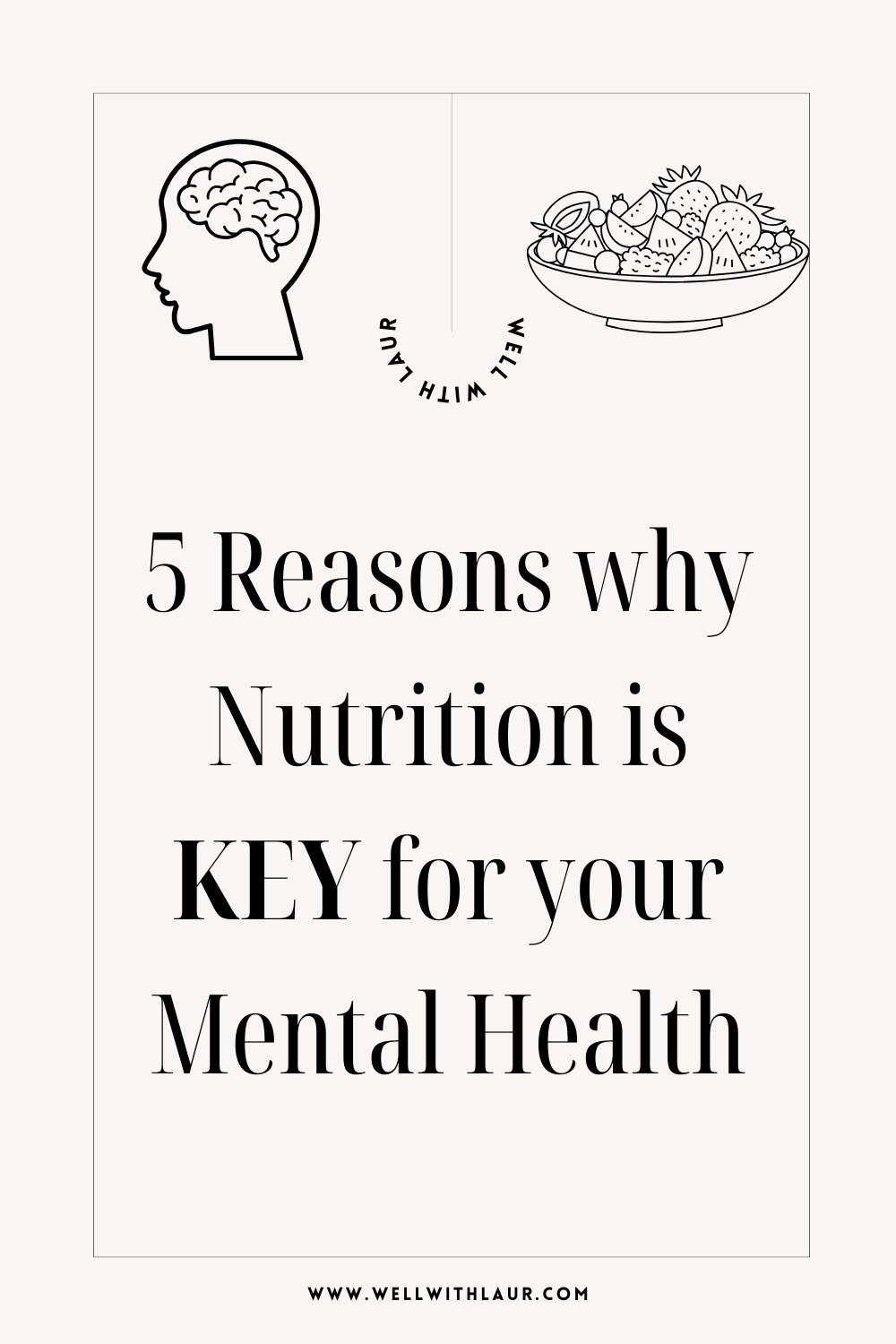In starting this blog, I thought it would be fitting that I share information that is out there regarding how to support your mental health through your nutrition or the foods you eat everyday. There are many foods we consume on a daily basis that could be contributing to a decline in our mental health and overall well-being. However, there are even more foods that we can be adding into our diet that have been found to promote the production of certain brain chemicals that can help decrease symptoms of underlying mental health conditions. I will preface this by saying that I am not a doctor, and you should always consult with your physicians before making any major lifestyle changes. This is advice that I have learned through my education and journey into wellness.
- What you eat impacts your gut microbiome, which is where many brain chemicals are produced
- Some refer to our gut as our “second brain” because it is a place where brain chemicals are produced. Some examples are dopamine and serotonin – which are responsible for our feelings of happiness and satsifation. These brain chemicals are lower in people who are diagnosed with depression and anxiety, hence why they are prescribed SSRIs (selective serotonin reuptake inhibitors). By creating a healthy gut microbiome through the eating whole and probiotic rich foods, it is thought that levels of these brain chemicals can also increase. This is especially true if those foods that harm our gut microbiome are limited.
- The standard american diet has been shown to have negative effects on our overall health
- A “standard american diet” typically consists of processed foods with added sugar, fats, and refined carbohydrates that have a negative impact on our body and mind. These additives can cause disbiosis in the gut, increase our blood pressure, and clog arteries. Instead of eating nutrient dense foods that have healing properties, this diet consists of overly processed factory-made foods that cause dysregulation in all of our body systems.
- Certain nutrients can increase production of brain chemicals that make us happy
- Dopamine is a neurotransmitter that contributes to feelings of satisfaction and motivation. We can increase our dopamine levels naturally through eating foods like bananas, fish, nuts, coffee, and chocolate. We can also increase dopamine by doing activities that we love – for some it could be playing video games or baking, others it may be spending time with loved ones.
- Serotnin is a neurotransmitter that contributes to feelings of overall happiness. Foods that support the production of serotonin include eggs, pineapple, oily fish (salmon), and leafy greens to name a few. Other ways to increase serotonin would be to get daily sunlight and engage in physical activity.
- Supplementing with different vitamins and minerals (or incorporating them naturally through food) can alter your brain chemistry
- Supplements are a quick and easy way to get essential nutrients. Many supplements boast health benefits, but you should be careful what you choose as these are not regulated by the Food and Drug Administration typically. You should always consult with your doctor before adding new supplements into your routine. Below are some vitamins and minerals that have been said to contribute to mental well-being:
- Vitamin B12: Those with depression are typically low on Vitamin B12. This vitamin provides us with energy and it’s absence leaves us feeling withdrawn and fatigued, which are common symptoms of depression. If you’re not up for supplementing B12, common sources include eggs, beef, salmon, milk and yogurt.
- Magneisum: Magnesium is an essential mineral that many of us may be deficient in. It is helpful for promoting feelings of relaxation and sleep. I started incorporating magnesium into my night routine and I feel so at peace, while also sleeping like a baby!
- Iron: Iron affects synthesis and signaling of the dopamine (regulation of happiness), norepinephrine (increases arousal) and adrenaline (helps you to react quickly). Having adequate levels of iron helps you to adapt to situations. Common natural sources of iron include leafy greens, dark chocolate, and red meats.
- Supplements are a quick and easy way to get essential nutrients. Many supplements boast health benefits, but you should be careful what you choose as these are not regulated by the Food and Drug Administration typically. You should always consult with your doctor before adding new supplements into your routine. Below are some vitamins and minerals that have been said to contribute to mental well-being:
- When you eat foods that you know are good for you, this can boost your confidence and belief in yourself!
- By starting each day eating a nutritious breakfast, you will feel more motivated to continue your day with these healthy habits. As the day goes on, you may notice how good you feel because you are replenishing your body with whole foods, making you more motivated to continue doing so. The next day, you will recognize how good you felt the previous because of those decisions, and it can become a snowball effect of healthy habits. By eating healthier, you may be motivated to incorporate other positive habits like walking, journaling, meditating, or reading. This all leads to a better you!
All this goes to say that the way we treat our body greatly affects our brain and our whole self. This is not to say that we have to eliminate all “unhealthy” foods from our diet – a good life is one of balance. Incorporate your healthy habits of eating nutritious foods, but also find ways to incorporate the foods, drinks, and activities that you love no matter what. For me, it’s my nightly dessert that I look forward to every day. It balances out in my mind with all the other habits I am keeping up with to promote my health. Go to my recipes page for some healthy recipe inspiration!

